Mục lục
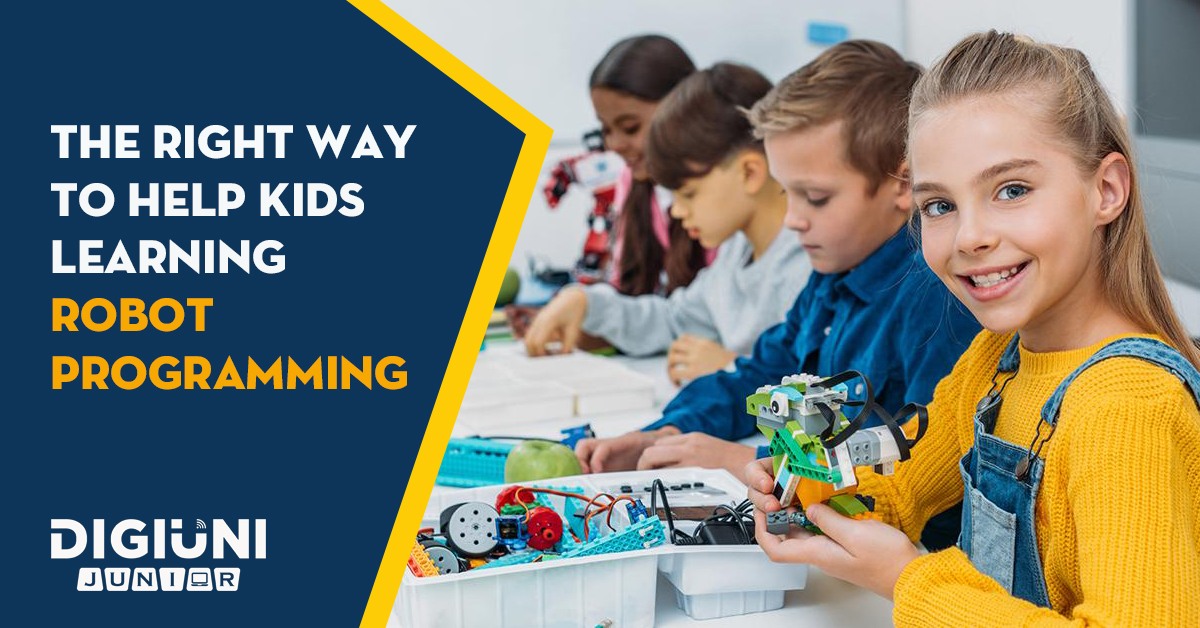
Robot programming becomes a new hobby for children to learn while having fun. As kids learn to build and program their own robots, it can provide lasting enjoyment and even dream of a future career. If children want to learn robotics, the best way to do that is to develop proficiency in computer skills, programming, science, physics, and math. From there, children can participate in programming classes, build robots, assemble robots, participate in projects and competitions taught and provided by DigUni Junio to build and develop comprehensive skills. necessary skills from logical thinking, reflection, math to skills such as problem solving, communication, teamwork, presentation… to equip a solid foundation when children learn more deeply about robot programming, future artificial intelligence and computer science. No matter what age children are, from 9 years old, children can learn this fun and engaging robot programming.
At DigiUni Junior, we build a specific learning path to develop skills and knowledge of robot programming from basic to advanced. When children learn in the right way, on the right route, they will promote their own abilities, progress quickly and become more and more interested in learning robot programming even at home.
Let’s find out how to help your kids learn to program robots the right way !
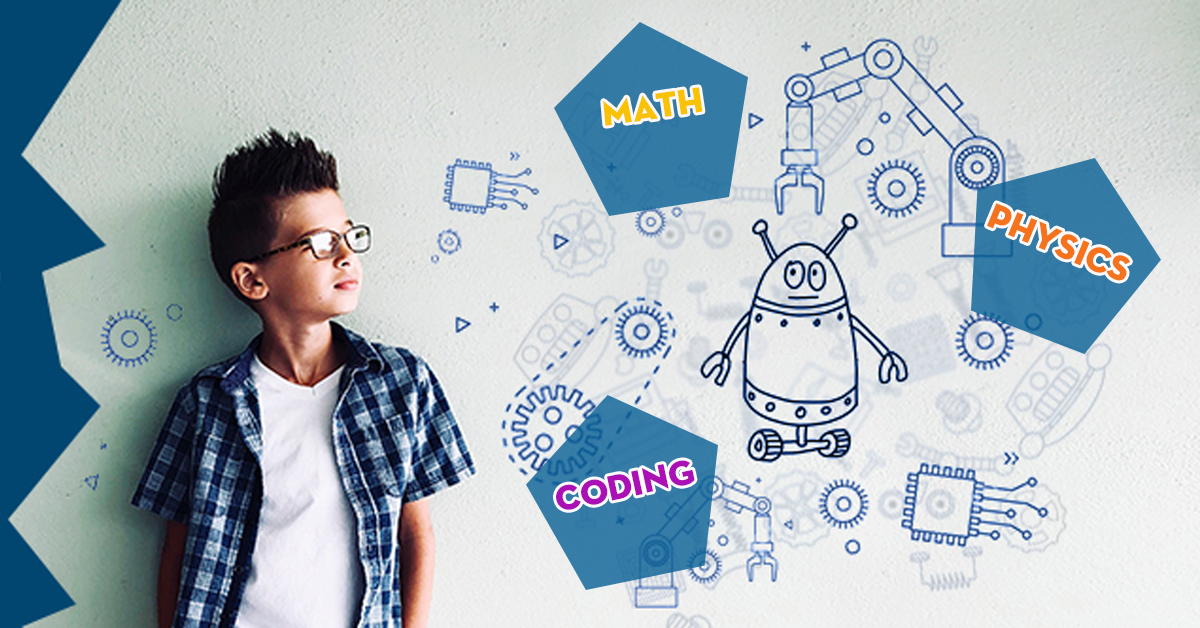
PART 1: LEARN BASIC KNOWLEDGE
1. Practice basic robot programming so that children can program their own robots.
Programming is a fundamental element of robotics, and children will need to know how to use variables, create conditional statements, use functions, and other basic coding skills. The most popular robot programming languages are Python and C++. We should choose Python – a popular and simplified programming language suitable for beginners. Python would be the ideal starting point for learning robotics.
2. Learn linear algebra to prepare for robotics.
Basic algebra is essential for both programming the robot and refining its code. Children need to improve their algebraic math knowledge at school or self-study algebra to strengthen their math skills. If your child has difficulty with math? Rest assured, DigiUni Junior’s experienced programming and teaching teachers are always dedicated to guiding, explaining and supporting children to overcome math challenges and find joy in learning math. Project-based learning and practice will help children understand concepts, retain long-term memory, and quickly apply newly learned knowledge.
3. Study physics as a foundation for robotics learning.
In addition to math, physics is also a subject that students often have difficulty in applying knowledge, but when they learn to program robots, they will be able to combine math and physics, understand basic principles such as how to help robots. move, perform an operation, interact with other objects, simulate actions, talk… Math and physics knowledge becomes more vivid and interesting when children learn to program robots and also help learning at school.
4. Study computer science to strengthen robotics skills.
Robots have a strong connection to computer science and a deep understanding of the process and sequence of execution before and after. Children will practice or learn basic computer skills and then they will try, proactively update their own computer science articles or websites.
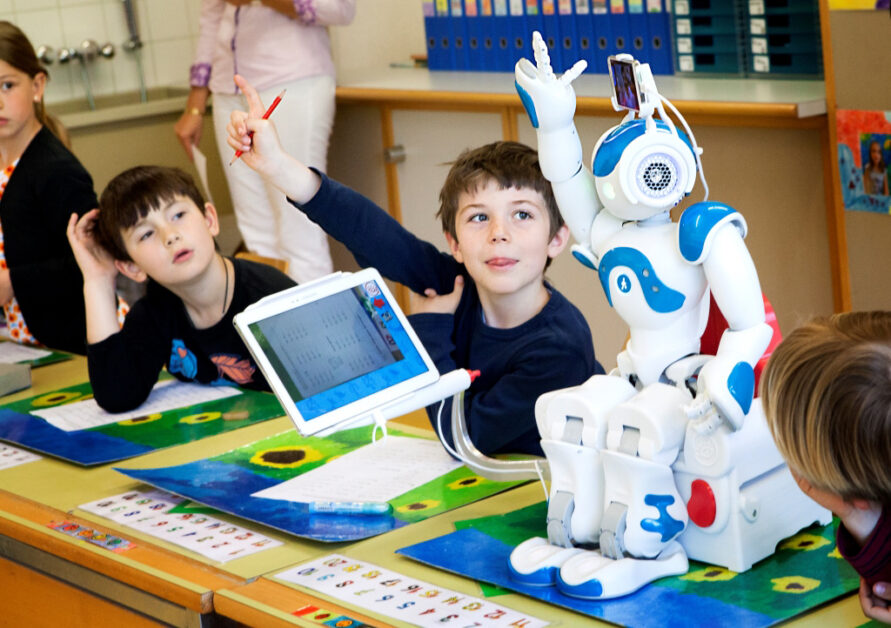
PART 2: BUILD ROBOT PROGRAMMING SKILLS
1. Children assemble and build robots by themselves using a robot kit.
When children have learned the basic skills of robot building, in the robot programming class we will provide a robot building kit for children to practice creating their first robot, programming the robot using coding, math and manual tinkering based on the teacher’s instructions. In addition, parents can buy more tools for their children with designs and styles they like for their children to practice and tinker with at home. Once children understand the parts that make up a robot, they can also build their own with parts and tools purchased from most electronics stores.
Starting from basic robots, few parts, simple operation programming to more advanced when children develop, assemble robots and program more complex operations for robots, can even create medical examination robots. , the robot plays music….depending on the creativity that the child wants.
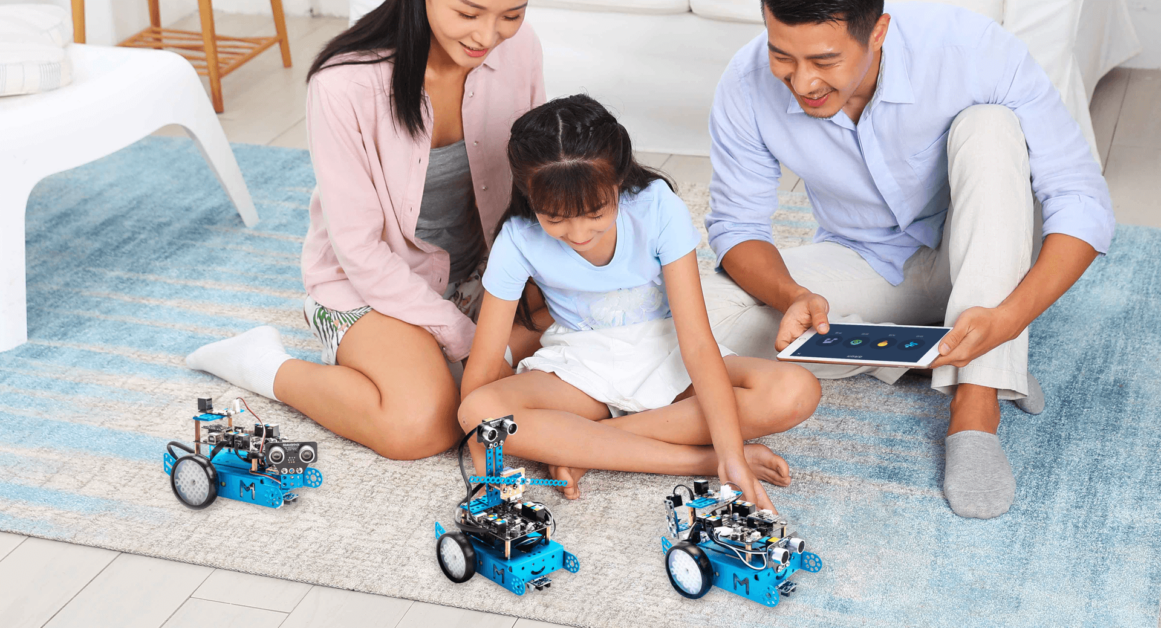
2. Learn robot programming in class or online and work in groups to strengthen skills.
We provide online and offline robot programming courses in class, with a standard of 2 hours / week, flexible study time for children and parents to arrange. Children should still practice with their own kits, whenever they have free time, to remember and apply the knowledge being taught. Besides, doing projects in groups is very important for children, they will discuss, assign tasks and help each other solve problems. Teamwork is a soft skill that helps children communicate, express well, and become more confident, but at school, most of them have not been trained in this skill.
Parents spending time playing with their children when building and programming robots is also a good idea, children will be very excited and proud to be able to show their parents what they have learned, and at the same time, parents will encourage and support them, giving their children more motivation, of course, through which parents also see their children’s clear progress after a period of learning to program robots.
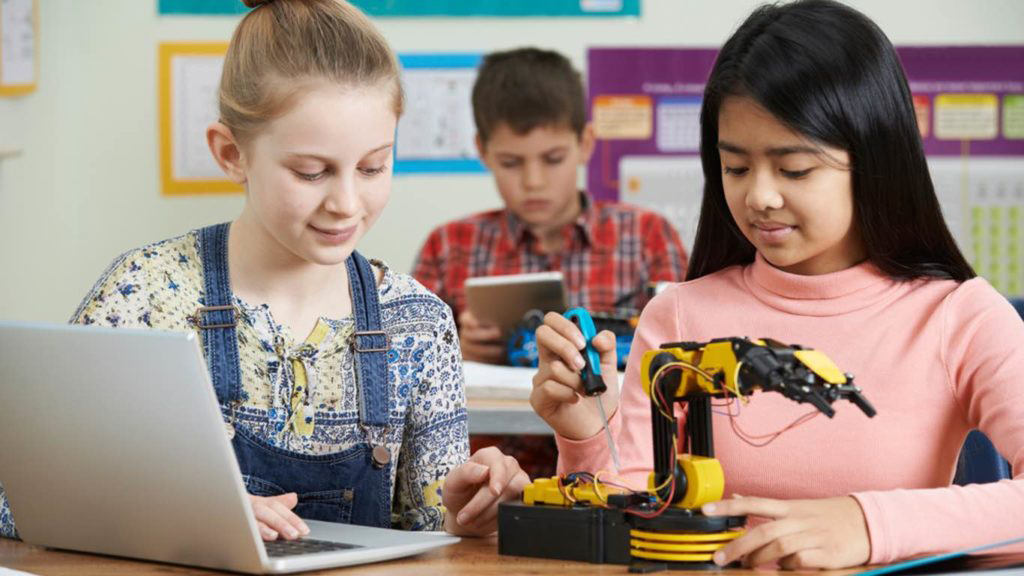
3. Take part in a contest or challenge on building and programming robots.
Currently, there are many domestic and international competitions on robotics for children to inspire and share the passion of the young generation with robotics. At DigiUni Junior, we also regularly organize small tournaments and robot competitions for young students. Children can participate as individuals or in groups, the topic is wide open for them to be creative. Of course, the rewards are also extremely attractive, often will be the latest robot kits, computers or tools for learning robot programming.
4. Register to participate in a large-scale robot competition.
When they have understood and practiced well, participating in robot competitions at school, domestically and internationally will add many skills and practical experience to them, more importantly, help them connect with the world. technology world, sharing love, making friends from all over the world.
Whether they won the prize or not, the children definitely got a boost from each competition. They will find teammates, find confidence, hone their public speaking skills. The important thing is to do the project themselves, to see the robot inventions from other friends with their own eyes, there are extremely new and interesting things waiting for your kids.
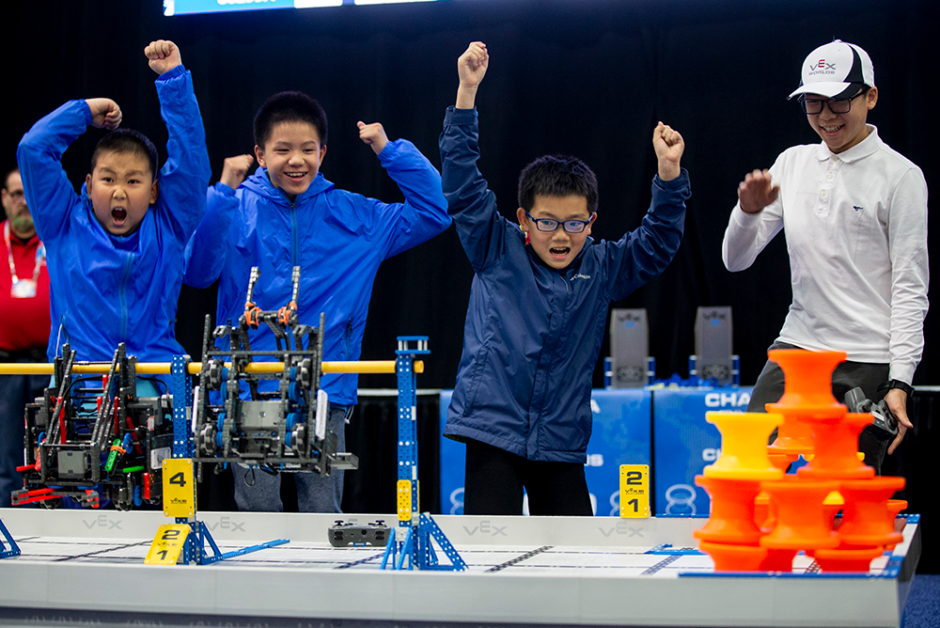
PART 3: STUDY ADVANCED ROBOT PROGRAMMNING
1. Learn trigonometry and statistics for advanced robotics.
While linear algebra is sufficient for basic robots, children may need to learn advanced math to build complex robots. Study trigonometry or statistics, advanced knowledge at school and self-study through manuals. Normally, we both teach advanced robot programming programs, teach how to read books by themselves, and recommend suitable books for students to study at home because at this time, advanced math knowledge can be achieved same as college and university students. It may sound overwhelming for children, but when children have understood basic math, basic robot programming, advanced math will no longer be difficult, but new and interesting knowledge in their minds.
2. Research Robot Operating Systems to customize projects.
Robot Operating System (ROS) is the most popular software system for building robots. If your child wants to build complex robots on their own without tools or instructions, learning how to use ROS can help them program their inventions.
Using ROS requires proficiency in a programming language preferably C++ or Python. As shared earlier, we will teach children the Python programming language as a beginner, because Python is simple and easy to learn. When children have mastered Python, with more advanced learning needs, we will introduce them to C++, a more complex language, usually only taught at universities/college. How do you think children in high school were able to study the program of university students? It’s entirely possible with the robot programming course at DigiUni Junior.
After finishing the robot programming course at DigiUni Junior, children will have many further directions such as higher education to get certificates, diplomas in IT at specialized universities in Vietnam and can go to work as soon as possible, even still students or study abroad in computer science, robotics, mechanical engineering, electricity, etc. and easily find a job abroad.
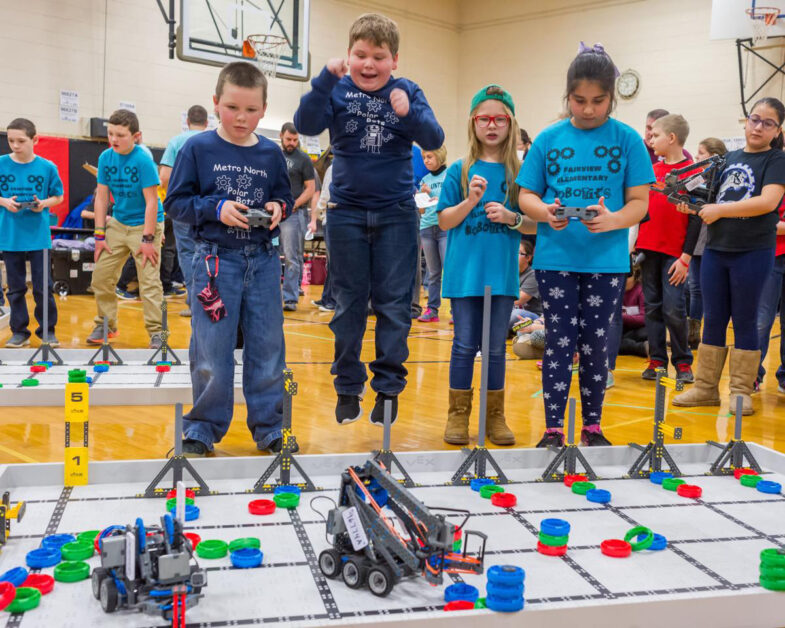
EQUIP ROBOT PROGRAMMING SKILLS FOR YOUR CHILDREN, TURNING HOBBY TO BE FUTURE EXPANDING CAREER OPPORTUNITIES!
With the rapid development of IT, computer science, robotics and AI, many jobs you may not have heard of will appear within the next 10 years. Robot programming will bring career opportunities for children in the future with occupations with high recruitment demand, great income, also an international and flexible working environment.
Here are some jobs that require robot programming skills:

- Robot programmer
- Software /application developer,
- Robotics Research Engineer
- Automated control engineer
- Automated robotics engineer
- Service account management
- Engineer of machine building and industrial robot
- Automation expert
- Robot Filler Operation Engineer
- Robot inspection and repair engineer
After all, there is a truth we need to accept. As technology advances, robots are working to replace humans, thousands of workers lose their jobs, a lot of jobs will disappear in the future. Your children learn robot programming today, they will surely become pioneers in using and controlling robots and are always sought after when looking for job opportunities.





